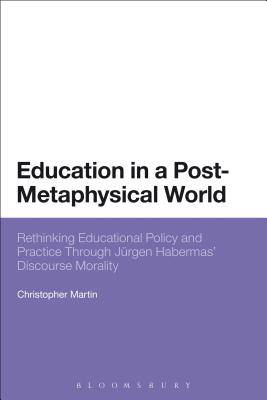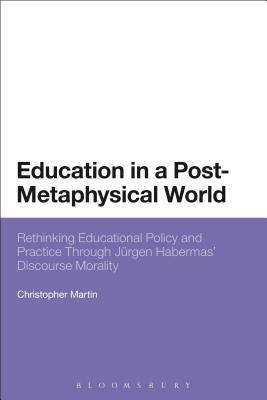
Bedankt voor het vertrouwen het afgelopen jaar! Om jou te bedanken bieden we GRATIS verzending (in België) aan op alles gedurende de hele maand januari.
- Afhalen na 1 uur in een winkel met voorraad
- In januari gratis thuislevering in België
- Ruim aanbod met 7 miljoen producten
Bedankt voor het vertrouwen het afgelopen jaar! Om jou te bedanken bieden we GRATIS verzending (in België) aan op alles gedurende de hele maand januari.
- Afhalen na 1 uur in een winkel met voorraad
- In januari gratis thuislevering in België
- Ruim aanbod met 7 miljoen producten
Zoeken
Education in a Post-Metaphysical World
Rethinking Educational Policy and Practice Through Jurgen Habermas' Discourse Morality
Christopher Martin
Paperback | Engels
€ 88,45
+ 176 punten
Uitvoering
Omschrijving
What does it mean to say that a person has been educated? This question forms the basis of global education policy debates; from the way governments establish funding for national school systems, to the way children are treated in the classroom. Should there be a common ethical core to such polices? What kind of educational process should aboriginal groups in Labrador, Canada, have a moral right to, and should this process be different from what children in New York's boroughs have claim to? Should a school-based curriculum, such as the UK's National Curriculum, make well-being a central concern or are there other ethical dimensions to be addressed? Christopher Martin explores these questions and argues that the best way to consider them is to view education as a matter of public moral understanding. He brings together traditions of thought central to philosophy of education, such as R.S. Peters, and connects this tradition to the moral philosophy and critical theory of Jurgen Habermas, whose theory of Discourse Morality has previously been given little attention in education circles.
Specificaties
Betrokkenen
- Auteur(s):
- Uitgeverij:
Inhoud
- Aantal bladzijden:
- 192
- Taal:
- Engels
Eigenschappen
- Productcode (EAN):
- 9781472569127
- Verschijningsdatum:
- 10/04/2014
- Uitvoering:
- Paperback
- Formaat:
- Trade paperback (VS)
- Afmetingen:
- 156 mm x 234 mm
- Gewicht:
- 299 g

Alleen bij Standaard Boekhandel
+ 176 punten op je klantenkaart van Standaard Boekhandel
Beoordelingen
We publiceren alleen reviews die voldoen aan de voorwaarden voor reviews. Bekijk onze voorwaarden voor reviews.









